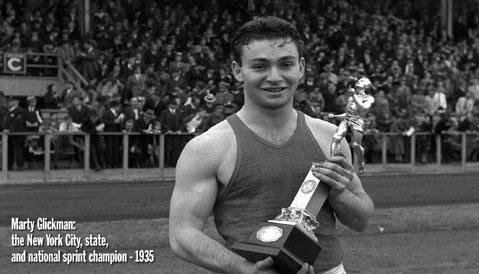Kolnoa Sidebar
SBIFF 2012's Examination of the Jewish State and Diaspora

The story of the Jew in the 20th century turns on the Holocaust. Not only was it an episode of unspeakable horror and mass trauma, its greatest consequence was the creation of a Jewish state. Before the establishment of Israel in 1948, Jews were a people without a land. The bulk of the world’s Jewry still resides in the diaspora, but, even for them, Israel is a symbolic center of gravity. The Kolnoa (Jewish-Israeli) — kolnoa is Hebrew for cinema — block of films at SBIFF interrogates this dynamic.
When an 18-year-old Jew from New York traveled to the 1936 Olympics in Berlin to run the 400-meter relay, nobody yet knew of Hitler’s plans to eradicate European Jewry. There were clues, however. Hitler’s anti-Semitic policies almost led to a U.S. boycott of the games, but U.S. Olympic Committee Chairman Avery Brundage successfully lobbied for participation. However, Brundage’s sympathies with Nazi Germany kept Marty Glickman and his Jewish teammate, Sam Stoller, from running. On the morning of their race, they were pulled, most speculate, because Brundage did not want to embarrass Hitler by putting Jews on the podium. The film, Glickman, tells the story of how Glickman, despite this seminal disappointment, went on to pioneer modern sports broadcasting, inventing most of the vocabulary with which we describe basketball (“swish,” “elbow,” “lane”), becoming the voice of the football Giants, and helping to found HBO.
Two years after the Berlin Olympics, British stockbroker Nicholas Winton also got a whiff of Hitler’s designs when a friend of his canceled a ski vacation to help Czechoslovakian Jews obtain refugee status. Instead of skiing, Winton decided to head to Prague himself, embarking on the task of spiriting 669 Jewish children to England before the Nazi invasion of Czechoslovakia. Most of these children lost their parents but 50 years later would learn about the adopted father who enabled their survival. In Nicky’s Family, we learn about what happened to many of the kids as well as Winton who, after the war, continued his life as a businessman without ever speaking of his heroic deeds.
The most poignant and polished film in the Kolnoa category may be be Follow Me: The Yoni Netanyahu Story, which recalls the tragically shortened life of Jonathan Netanyahu, the brother of current Prime Minister Benjamin. Netanyahu was a charismatic soldier who kept putting off the higher education which he began at Harvard to re-enlist in the army. Serving as the commander of an elite combat unit akin to our special forces and colloquially referred to as “The Unit,” he died in 1976 while leading a risky but successful mission to rescue Israeli hostages from a hijacked plane at the Entebbe Airport in Uganda. Netanyahu left behind a record of his intellectual precocity in the letters he wrote to friends and family which, read aloud, narrate much of the film. Netanyahu dotes on the physical geography of Israel’s landscape, finding in it a sense of place from which he feels displaced when his father, a famous scholar, moves the family to Philadelphia to complete a book project. Although Netanyahu’s letters sometimes ring with the exuberant, unexamined patriotism of youth, Netanyahu offers a cogent argument for Israel as a homeland worth fighting for.
The power of Netanyahu’s vision, however, results from a context in which the Jewish state of Israel’s existence was extremely tenuous. Thirty-five years after Yoni’s death, the country is a prosperous global, multicultural democracy and nuclear power. And demographers have been predicting for years that without a two-state solution, higher Arab fertility rates will eventually doom Israel’s Jewish majority. Two films, Homecoming, and the Woolfian-titled A Place of Her Own question Israel’s stability as a homeland which can serve as an antidote not only to Jewish persecution but the Modern crisis of displacement, both geographical and cognitive. Homecoming follows three teenage children of immigrants who travel to their parents’ countries of origin: the Congo, Philippines, and Peru. Neither Jewish nor Arab, these children know they are outsiders in Israel, but they feel even more alienated when visiting the developing world their parents escaped from.
Homecoming leaves viewers wishing they had gotten to know the three teenage protagonists a little better, and visually feels a bit less refined than some of the bigger budget films on the Kolnoa slate. Yet, it raises the most urgent questions for contemporary life inside of Israel and out. Discussions about the legal status of the children of foreign workers are not unique to Israel. And the question of identity — “I don’t really know what being Israeli means,” says Otto, whose parents are South American but who aspires to become a paratrooper in the IDF — will continue to persist in a world where both labor and culture can travel further and faster than ever. Israel, a country whose founders fought to build a home for the members of the Jewish diaspora, is now home to growing Gentile diasporic communities. Viewed in whole, the Kolnoa films take us on Israel’s journey from dream to reality to fraught political entity.



